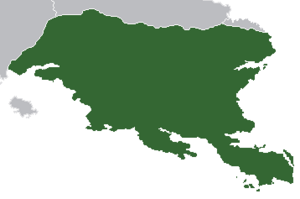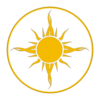Internet in Gylias
 Gylias in Tyran | |
| Top-level domain | .gls |
|---|---|
| Internet users | 21.881.000 (98,7% of the population) |
| Internet hosts | 10,5 million |
| Fixed broadband subscriptions | 11.173.277 (50,4% of the population) |
| Mobile broadband subscriptions | 24.607.812 (111% of the population) |
| Average connection speed | 22,5 Mb/s |
| Data compiled in 2015 by the Bureau of Statistics and Accounting. | |
The use of Internet in Gylias is widespread, having one of the highest usage rates in Tyran. Gylias has a well-developed internet infrastructure, ranking among Tyran's top countries in terms of total number of users, percentage of fixed and wireless broadband subscriptions, and average internet connection speed.
The Gylian internet has certain distinctive characteristics, influenced by specific public policy and the general characteristics of post-Golden Revolution society and culture.
History

The development of the internet in Gylias grew out of a combination of the domestic computer industry and international developments.
Forerunners of the internet are considered to include the Hermes Programme, whose successful implementation gave Gylias early experience with cybernetics, and Infotel, a videotex service introduced by Gylian Post and Telecommunications (P&T) in 1980.
The Cybervote system, a pilot experiment intended to allow voting on planning decisions through the Hermes Programme, ran from 1972 to 1974, and was shelved due to the state of contemporary technology.
A national research and education network, GUNET, was created in 1984, linking Gylias' universities. The system would later be expanded as part of a Common Sphere project to link all member states' universities and research institutions, Commonet. During the late 1980s, efforts were made to configure personal computers to connect to Infotel.
Development of ICT was a key component of the Mathilde Vieira government's stimulus and modernisation program, following its election in 1990. Rapid growth in internet use occurred starting in the 1990s:
- A nationwide government-funded program was launched to install internet connections in households, educational institutions and community spaces.
- The number of ISPs and websites rose rapidly.
- P&T carried out a process of transferring the existing Infotel network and userbase onto the larger internet in 1993–1999.
Average connection speed rose as Gylias transitioned from dial-up internet access to broadband as the primary mode of access.
Policy-making in the ICT field evolved to a more balanced approach in the 1990s. P&T retained a monopoly on the national broadband and fiber-optic infrastructure, and cooperative ISPs became the norm, first with neighbourhood ISPs and later with wireless community and municipal networks.
The popularisation of the internet was accompanied by a push to use its capabilities for public service purposes, resulting in the publinet. Technological sovereignty was emphasised, with public support and assistance used to ensure that Gylian-made technology and software was used for the internet.
Internet access was further expanded by the creation of numerous Internet cafés and telecentres, complementing existing community spaces that were provided with computers and internet access. Gyldiv's introduction of the Satellaview in 1995 allowed Ion owners to connect to the internet and receive satellite television and satellite radio broadcasts. The growth and widespread adoption of the internet was very beneficial to Gylias' flourishing demoscene, videogaming, and independent production communities.
Public policy
Internet-related public policy since the 1980s has been based on the principle that it should be non-commercial, democratic, and accessible to all. Resulting policies have shaped the Gylian internet in unique ways among Tyran's internet users.
The most significant policy is P&T's national monopoly over internet infrastructure, mirroring its existing monopolies over telecommunications and postal services. The combination of public ownership of the connection infrastructure proper with a strong competition law regulatory framework has given Gylias notably cheap and fast internet.
A majority of ISPs are neighbourhood, municipal, or community-run; all are organised as utility cooperatives.
Public infrastructure has expanded to include nationwide fiber optic, ADSL, and wireless connections. Internet access is also publically available in a variety of social centres and community centres, as well as more specialised public places such as internet cafés and telecentres.
Similarly significant has been the push for technological sovereignty, to avoid dependence on other countries and companies for infrastructure and technology. As a result, Gylian websites overwhelmingly use the .gls top-level domain, and internet infrastructure and platforms are locally-created and owned.
Information privacy on the Gylian internet is governed by the Law on Privacy Protection of 1993, one of the most stringent and heavily enforced information privacy laws in Tyran.
Publinet
The publinet ("public internet") is the collective term for a network of public organisations set up to provide digital distribution services for culture and the arts. The companies are as follows:
- Proton — responsible for distribution of music, films, television shows, and video games.
- NetStream — responsible for online video hosting.
- Freemix — responsible for distribution of remixes, and stems and multitracks of songs that allow others to remix and sample them.
- Samplexicon — an online database of information about sampling in music.
- BiblioNet — responsible for distribution of books and articles, as well as their digital preservation.
- Telecomix — responsible for distribution of comics, as well as their digital preservation.
- ArtNet — responsible for distribution of artworks, as well as their digital preservation.
The publinet companies are automatically connected to a unified database, allowing works updated to be automatically linked across sites.
Publinet sites use peer-to-peer file sharing technology to allow visitors to download their respective files, in order to reduce server load. They do not use advertising, and are funded mainly by the government as public organisations, with subscriptions offered for users who wish to contribute to their maintenance.
Cyberculture
As many publinet and media-related sites do not include comment sections, Gylian blogs, chat rooms, online communities, and social networking services are an important outlet for popular interaction and participation.
Certain experimental forms of digital media and digital art have emerged as a result of the internet's growth, including hypermedia, hypertext fiction, cybertext and other forms of ergodic literature, interactive media, video art, and internet art.
The Gylian demoscene attained a level of success and mainstream recognition above that of other countries' demoscene. Music trackers came into common use as a way to create music, with many notable Gylian musicians using them for their works, and saw similar success in use for video game music. Many demoscene artists and programmers later entered the Gylian video gaming industry.
Internet censorship
The Constitution of Gylias protects freedom of speech and freedom of expression, within a legal framework that includes strong anti-discrimination and anti-hate speech legislation.
Instances of judicial action, prosecutions, and bans have involved sites that promote discrimination, hate speech, anti-constitutional organisations, genocide denialism, defamation, and deliberate misinformation in violation of Information Bureau regulations.
